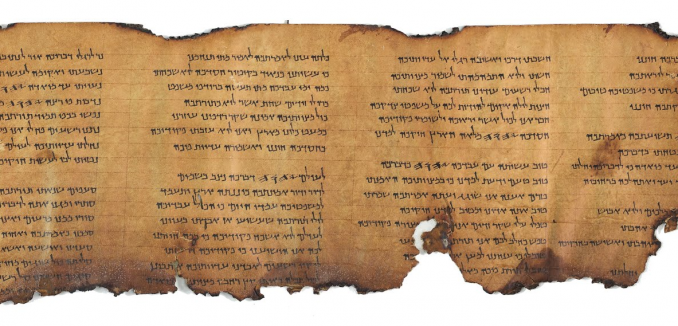Israeli officials believe that the Palestinian Authority is seeking to use the United Nations’ cultural body to lay claim to the Dead Sea Scrolls, a collection of nearly 2,000-year-old biblical manuscripts considered to be among Israel’s greatest archaeological treasures, The Times of Israel reported Sunday.
The ancient Hebrew scrolls, discovered in 11 caves at the Judean Desert between 1947 and 1956, include some of the oldest extant copies of the Jewish bible written on parchment dating back to the time of the Second Temple. They are believed to have been written or compiled by Jews who fled Jerusalem to the desert in the centuries before the temple’s destruction. “The manuscripts are the earliest copies of the Hebrew Bible ever found, and the oldest written evidence of the roots of Judaism and Christianity in the Holy Land,” the Times noted.
The ancient texts, which were painstakingly pieced together, translated, and digitized by Israeli archaeologists, are now stored in climate controlled rooms at the Israel Museum’s Shrine of the Book.
UNESCO officials last month told Eitan Klein, deputy director of the Israel Antiquities Authority, that the Palestinians had informally raised the issue of demanding possession of the scrolls and were likely to put forth an official petition. The news comes on the heels of UNESCO’s decision to approve two Arab-drafted resolutions that characterize Jerusalem’s Temple Mount — Judaism’s holiest site — as exclusively Muslim.
“This is another instance of provocation and the ‘hutzpah’ of the Palestinians trying to rewrite history and erase our connection to our land,” said Carmel Shama-Hacohen, Israel’s envoy to UNESCO. “The fragments of the scrolls are proof and a weighty archaeological evidence of the historical connection of the Jewish People to the Land of Israel,” he added. “In any case, just like with the Temple Mount and the Western Wall, the scrolls will stay in our hands and the Palestinians will be left with their dreams.”
The issue was reportedly discussed at the Intergovernmental Committee for Promoting the Return of Cultural Property to its Countries of Origin or its Restitution in case of Illicit Appropriation, a UNESCO committee on which Israel only has observer status.
The news prompted a backlash on social media, with many Twitter users ridiculing Palestinian efforts to claim a piece of Jewish history with the hashtag #PalestinianClaims.
Meet William al Sheik-Speare, a famous Palestinian writer #PalestinianClaims @kishkushkay pic.twitter.com/gscU5KaBfk
— BevL (dandiedinmont) (@dandiedinmont) November 6, 2016
Very rare Palestinian art (20,000,000 BCE) discovered last week at site of Palestinian Dead Sea Scrolls. #PalestinianClaims @StandWithUs pic.twitter.com/fgJDZ5Nxem
— (((Kay Wilson))) (@kishkushkay) November 6, 2016
Wow, after 108 years, the Palestinian Cubs just won the World Series! Amazing. #PalestinianClaims pic.twitter.com/xs6qGu3AXa
— Arsen Ostrovsky (@Ostrov_A) November 6, 2016
The controversial Palestinian effort, along with UNESCO’s adoption of resolutions denying Jewish and Christian ties to Jerusalem, comes amid a number of archaeological discoveries that further cement the historical Jewish connection to Jerusalem.
Last month, the Israel Antiquities Authority (IAA) presented the oldest Hebrew-language mention of Jerusalem yet found, dating back some 2,700 years to the time of the First Temple. Days later, Israeli archaeologists revealed that artifacts from the First Temple period had been unearthed in situ on the Temple Mount. The week before those two announcements, the IAA said that it had located the place where Roman troops breached the walls of Jerusalem during their siege of the city and eventual destruction of the Second Temple nearly 2,000 years ago.
Evidence of the Christian history of Jerusalem also emerged last month when the National Geographic reported that workers restoring the Church of the Holy Sepulchre claimed to have uncovered the tomb of Jesus, which was buried under layers of marble for centuries.
Palestinian attempts to erase or cast doubt on the well-established historical connection between Jerusalem and the Jewish faith, which The New York Times noted in October of last year, is a phenomenon that former Israeli Foreign Ministry Director-General Dore Gold described as “Temple denial.” Days after the Times report, the Mufti of Jerusalem, who was appointed by Palestinian Authority President Mahmoud Abbas, claimed that the Temple Mount has been the site of a mosque “since the creation of the world” and that it never housed a Jewish temple, despite ample evidence to the contrary.
David Hazony, editor of The Tower, wrote in 2007 that “Palestinian leaders, writers, and scholars have embarked on a campaign of intellectual erasure…aimed at undermining the Jewish claim to any part of the land,” of which Temple denial is a component.
In October, Petra Marquardt-Bigman warned in The Tower that UNESCO’s erasure of Jewish and Christian ties to the Temple Mount was a reward for “almost a century of Palestinian intransigence and deadly incitement.”
Eylon Aslan-Levy described the Palestinian efforts in UNESCO to deny the historical Jewish connection to Jerusalem as an attempt “to render Israeli sovereignty over the Old City utterly illegitimate, do the most damage by prejudging how the international community should approach the question of the holy sites in any future accord.”
[Photo: Israel Antiquities Authority ]




